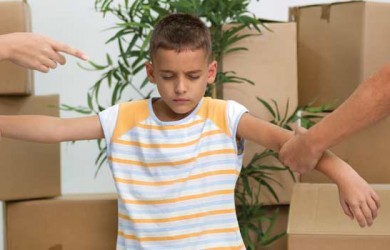25 Sound Tips on How to Be a Better Parent

 Listen to this article
Listen to this articleWhen contemplating how to be a better parent, everyone hopes to find the magic answer. Many adults need to learn as they go since each child is different, coming with a unique personality and set of problems as they grow.
There is no one-size-fits-all approach, and as they say, “they don’t come with an owner’s manual” (which would be so helpful).
One of the unwritten rules is we won’t find a perfect child and would never have that expectation, and none of us will ever be the perfect parent and should not strive for that goal. Perfection is unrealistic and unattainable for any person.
What we need to do as imperfect humans is work each day to learn from the mistakes we’re bound to make that day so the next day we can become a better parent of our own volition, sort of a trial and error process.
It’s essential to understand the progression into being a better parent continues as long as you’re alive. Even after they’ve grown, you’ll always be working to improve how you interact, advice you give, and knowing your place when grandkids come along. That’s a whole other learning process.
Meaning of good parenting
Being a good parent means making yourself available to your child in every situation as their support system. That doesn’t imply only when things are going well or when good things occur.
It’s also when things become challenging, or there are difficult times, angst, and challenges a young person doesn’t know how to deal with.
You might not have all the answers, but together you can research for the answers to help resolve the challenging problems. Solutions may not always be cut and dry or austere, but the important thing is to show persistence to make it clear your goal is to help.
Sometimes that’s enough knowing there’s someone in their corner. If you want to work on being a better parent, read this book titled The Collapse of Parenting by Leonard Sax, MD, P.hd.
Role of parenting styles in children’s upbringing
The role of parenting styles in a child’s upbringing is crucial, impacting various aspects of their development.
Different parenting styles, such as authoritative, authoritarian, permissive, and uninvolved, provide varied emotional contexts and behavioral patterns that significantly influence the child’s overall growth and development.
This highlights the importance of parenting tips for parents, emphasizing how to be a good parent to a baby, and the impact these styles have on children’s progress in multiple developmental domains.
Role of discipline in parenting
Discipline plays a fundamental role in parenting, acting as a guide to help children understand boundaries, respect, and self-control. Effective discipline, a crucial part of parents advice to their children, is about teaching rather than punishing.
It involves setting clear rules and consequences, being consistent, and modeling appropriate behavior. This approach helps children learn from their mistakes and fosters an environment of trust and understanding.
For new parents, incorporating discipline is essential in their parenting tips for new parents toolkit. It’s about nurturing a child’s ability to make sound decisions and fostering a sense of responsibility, essential for their growth into well-rounded individuals.
Impact of home environment on a child’s learning
The home environment significantly impacts a child’s learning, offering the initial and most influential learning context. A nurturing, stimulating, and supportive home setting enhances cognitive and social development. This environment includes elements like parental involvement, educational resources, and emotional support.
For parents wondering how to be a better mom or how to become a better parent, creating an engaging and positive home learning environment is key. It fosters curiosity, critical thinking, and a love for learning.
Parents can encourage this by engaging in meaningful conversations, providing access to books and educational materials, and showing interest in their child’s academic progress.
Role of parental self-care in good parenting
Parental self-care is a critical component in being a better parent and becoming a better parent. It involves parents taking time for their physical, emotional, and mental well-being. When parents care for themselves, they are more likely to have the energy, patience, and clarity needed for effective parenting.
Regular self-care reduces stress and burnout, enabling parents to respond more calmly and thoughtfully to their children’s needs. It also models healthy habits for children, teaching them the importance of self-care and emotional regulation.
Ultimately, when parents prioritize their well-being, they are better equipped to provide the nurturing, stable environment necessary for a child’s development.
5 qualities of a good parent
Numerous qualities are necessary to learn how to be a better parent. Many adults who enjoy the process plus put in the time and effort share commonalities in character traits displayed with their children. Some of these include:
1. Breathe deeply and carry on
Kids are not always going to be the “model citizen.” When learning how to be a good parent to a toddler specifically, you need to master the skill of patience.
There will be behavioral issues, messes, and sassiness, plus cute and pretty terrific. Allow them to develop who they will be, take that deep breath and carry on with appropriate positive reinforcements.
2. Motivation and encouragement
As kids get into the school environment, self-confidence and self-esteem can become victims of other children. It’s essential to ensure that you’re motivating your kid every day.
In this way, the self-doubt that might creep in and the opinions of others that could take a toll are overshadowed by the encouragement you provide.
3. Bend when you fail
You will fail and need a backup plan. That requires flexibility to change up what you initially thought would be a good solution that turned out wrong. Don’t get emotional or show defeat. It’s essential always to remain calm and think of Plan B.
4. Laugh
Kids have a hilarious demeanor and can be silly; laugh with them. Show them you have a fantastic sense of humor and that it’s okay to have a good time. Laughter helps reduce stress and decreases the worries plaguing you as the parent and your child.
5. The leader, not the boss
While you might be the “boss of the house,” there’s genuinely no good reason to throw your weight around. Instead, take control of situations in a “leadership” role as you would in a workplace situation. Teach your kids how to be natural leaders instead of bossy.
25 practical tips on how to be a better parent
Most of us wonder daily how to be a better parent. In reality, what kids want is parents who will make themselves available, show support, love them unconditionally, and provide constructive discipline.
You might find that hard to believe, but children want to be corrected. It’s part of showing that you care when you make them accountable for what they do that’s inappropriate.
They might be grounded, but they know you love them. Dr. Lisa Damour offers a series of podcasts on The Psychology of Parenting to provide more guidance. Check a few of them out. Let’s look at a few ways to be a better parent.
1. Express appreciation for attributes
All kids have strengths. It’s vital to express your appreciation for their attributes by complimenting them regularly.
It not only builds their self-esteem and helps to develop their confidence but motivates their growth and desire to chase after goals or dreams they might have as they get older.
2. Speak in a calm voice
There’s no reason to shout or yell at anyone, especially a young person. It’s demeaning and just uncalled for. In the same way, you wouldn’t incorporate corporal punishment on a fur baby, there should be none with a child, including raising your voice.
If there’s an issue that needs discussing, a calm discussion about consequences and then following through with those repercussions indicates ways to be a better parent.
3. Corporal punishment and what that entails
Corporal punishment is not just about yelling. When we speak of unfavorable treatment of a child, there should never be an occasion where you spank or hit a little one.
A time-out appropriate to the child’s age is a reasonable positive disciplinary reaction, but there should never be any sort of mistreatment or abuse.
4. Make sure to be present
Being a good parent means setting aside time each day to actively listen to what’s happened with your child that day.
That means putting away all potential distractions, avoiding interruptions, and sitting down for a quiet period of one-on-one conversation, complete with open-ended questions that will lead you into a dialogue.
5. Pick an interest
In that same vein, let your kid choose an interest or a hobby that the two of you can enjoy, perhaps one day each week or even monthly together.
Performing an activity, especially one outside your comfort zone, will bring your relationship closer and help your child see you in a different light.
6. Affection needs to last longer
The suggestion is that the “happy chemicals” in our brain take several seconds to release when you’re showing a partner or a child any kind of affection.
That means when you hug a little one, it needs to be as long as perhaps 8 seconds for them to get those chemicals flowing – and you too.
7. Sassiness can be tough
If your child is talking back, this is the time to draw in all your strength to learn how to be a better parent. In many cases, they’re learning to exert their opinion on the topic you’ve introduced, regardless of whether it’s their being in trouble for something inappropriate.
Of course, the kid is handling the situation poorly by being sassy, but as the parent, you can encourage a discussion but only if they decide to do so with a different attitude. If the little one can’t do that, there will be more consequences for this unacceptable behavior.
8. Is this as important as some of the other issues?
Sometimes you need to “pick your battle.” Some are serious and require handling. Others are not so much and can be let slide. Then, when something major happens, the kid listens to what you have to say instead of zoning out because you tend to bring up every little thing.
9. Be a proactive parent
When you consider what makes a good parent, someone proactive with teaching new skills comes to mind. When reading stories to your small one, it’s wise to ask questions as you go through the story.
This helps you see if the child is getting the gist of what the story is about and allows them to explain what they’re learning as it plays out, plus have them point out new words they’ve learned as you read together.
There are also unique ways to present counting and math skills, but you need to research methods in which you believe it would be the easiest for your child to pick up the skills since each kid learns uniquely.
10. Kids need to be spoken to and treated age-appropriately
We sometimes forget that our toddler is a small person or that our teenager is not a toddler. When speaking to a tiny person, they don’t understand you’re giving them a dissertation on the whys and what-ifs of the problem at hand before finally giving them the consequences.
It goes right over their head and out the window. The same goes for teenagers when you speak down to them as if they’re a small child; it also goes in one ear and out the other. Your parenting needs to follow the child’s age with whom you’re dealing.
11. Resolving arguments between kids
If your kids are arguing among themselves or your child is fighting with the neighborhood kids, it’s up to the adults who are learning how to be a better parent to intervene.
In becoming a better parent, you should have constructive ways for children to resolve their issues and help them learn how to do that.
Using a kids’ game to come to a solution, like perhaps “rock/paper/scissors” or another method, will make the outcome fair and satisfy everyone involved.
12. A partnership needs to be healthy
Children watch everything that occurs in the household. It’s vital that you maintain a healthy partnership as parents, meaning you don’t neglect it because you have children.
No one would expect that. There should be date nights where grandparents babysit and affection and interaction that kids witness showing that their parents are doing well.
13. Parents united
Parents don’t always agree on the way to bring a child up. In fact, there can be disagreements in areas like discipline, causing tension between parents that a kid will usually pick up on.
For those who want to learn how to be a better parent, it’s vital to communicate the differences privately and present a united front to the children.
No one wants kids who will pit parents against each other, and that can be a probable scenario if little ones see parents bickering over how to handle troublesome situations.
14. Nagging is a no go
When you’ve heard mom/dad for the gazillionth time and can’t stand it another minute, the appropriate response is typically one where you sit down, listen to what the little one has to say for the last time (letting them know it is the last time).
After that, tell them that you have already answered this question several times, but since you’ve listened attentively for this period of time, they need to quietly listen as you answer for the final time, and then the subject will be closed with no more nagging.
15. Change your perspective
Check out the children’s perspective instead of looking at parenting as a “me vs. them” kind of deal. Most kids look at the world with innocence. They forgive with no question about holding a grudge.
Their primary goal each day is to have fun and enjoy life, and they like to take things slow, relaxed, and calm instead of rushing, being chaotic and stressed. Maybe they have the right idea, and we’re the ones with the wrong outlook.
When talking with them about issues, we need to remember how they view life and not think of these from our standpoint in order to be a good parent.
16. It’s okay to take a break
Taking a break from parenting is actually one method on how to become a good parent.
It can be a shared experience with other parents in the neighborhood where perhaps each of you can take turns carpooling a group of children to school while the other parents have the day to do as they please.
Then the next day, you take your turn as the carpool parent. Breaks like these refresh and rejuvenate, so there are no short tempers or exhaustion because parenting is a full-time, often exhausting role.
17. Journal
When considering how to be a better parent, one technique is journaling each evening before sleeping. These thoughts are only positive expressions of a few things that went well with your child that day.
These things will bring good thoughts to the end of the day and make you feel as though you can say you know what makes you a good parent.
18. Set goals for family
When you question whether are you a good parent, answer that question by looking over an outline you developed with achievable goals on becoming that good parent. Again it’s important to be realistic because no one is perfect.
A child will give you a different day every day with a new set of issues and an evolving personality. That means you need flexible goals, but that should be achievable. Perhaps after school, you can have a date for an ice cream cone and a conversation each day.
That’s a goal that can turn into something you do well into the teenage or even adult years. Maybe not always ice cream, but possibly something more appropriate as the child grows older.
19. Allow choices
When a child believes they have a semblance of control over their decisions, it allows for creativity and innovation in their thought process.
While you don’t want the little one to have free reign entirely until they’re a bit older, giving choices for them to decide from gives that same sense of freedom and makes the kid believe that he made the call. That’s stimulating for all children.
20. Show affection
Your child might fight it and blame you for embarrassing them, but deep down, it makes them feel good and loved when you shower them with affection, even in public.
No one wants negative feedback in front of other children or parents, which can happen a lot, especially in games or sports, but when you have a parent out there cheering with all their heart, you can act like it’s humiliating, but it’s pretty cool.
21. Understand there will be change
While you might become attached to the way things are and be shocked when that is no more, you must embrace the fact that your child is growing and changing from day to day.
Their likes, dislikes, and things they’re into won’t stay the same, sometimes even for 24 hours, and that’s okay. As parents, you can only attempt to keep up with the changes and be happy that your kid is exploring what’s right for them and learning what isn’t.
22. Never too early for a lesson
In today’s world, kids need to start learning “adult” lessons earlier, including saving money and managing their savings appropriately. The first step is buying a piggy bank that the child would need to physically break to get the cash out.
When the little one adds some change, find out how much they added and match that amount. It will excite the kid to see how it grows. While they will become antsy to spend the money, the fact they would have to break their piggy makes them hold out.
23. Never compare
If you’re trying to discern how to be a better parent, one distinct way to not be a better parent is to compare children, whether you have more than one child or your kid has a friend that comes over all the time.
That should never be a thing. While you might believe it will motivate a child to do more or become motivated, it will only result in resentment towards you and the child you’re comparing them to, plus establish issues for them that sometimes carry on into their futures.
24. Take playtime outside
Make sure that your children get out of the house and into nature. The electronic, digital world is something kids will undoubtedly need to understand and learn, but that doesn’t mean they need to be connected 24/7.
You can lead by example by disconnecting from your devices and going out to shoot some hoops with them.
25. Check out parenting materials
Whether you go to classes, read books, or even go to a counselor, become educated on being a better parent and continue these methods as your child grows.
This way, you’re always up to date on new methods and techniques you can use to give you a stronger degree of confidence as an adult and help to benefit your child as they grow.
One audiobook that’s worth checking out is “Raising Good Human,” Hunter Clarke-Fields, MSAE, and Carla Naumburg, PhD.
Want to raise successful kids? Watch this Ted Talk by Julie Lythcott-Haims about how to do so without over-parenting:
FAQs
Parenting is a journey filled with questions and uncertainties. From balancing personal needs to choosing the right parenting style, parents often seek guidance to navigate these challenges. Here are answers to some common parenting questions:
-
How can I balance parenting with my own needs and goals?
Set realistic expectations and prioritize self-care. Allocate time for your interests and goals, and involve your family in your journey. This balance is key to maintaining your well-being and being a present, positive parent.
-
Is there a “perfect” parenting style?
No single style is “perfect.” Effective parenting adapts to a child’s needs and family circumstances. Combining warmth, understanding, and appropriate boundaries often leads to positive outcomes.
-
How do I handle the guilt and pressure of parenting?
Acknowledge that no parent is perfect. Give yourself grace for mistakes and focus on learning and growing from them. Seek support from fellow parents and remember that your best effort is enough.
-
What resources are available to support my parenting journey?
Numerous resources, including parenting books, online forums, parenting classes, and support groups, offer guidance and community support. Consulting with child development experts or family therapists can also be beneficial.
-
Does my past affect my parenting abilities?
Your past experiences can influence your parenting, but they don’t define it. Awareness and a willingness to learn can help you overcome negative patterns and build positive parenting practices.
Happy parents, happier children!
Being a good parent is something you’ll always try to get a better handle on. It’s a constant learning process. It’s not easy – no one would ever lie to you like that.
Still, there are plenty of materials to guide you through each stage of development, plus you can attend parenting classes to stay up to date on methods to use with your children to make the home environment a healthy, constructive, happy atmosphere.
 Tips
Tips
Write your tip or submit a video tip
All tips are reviewed before the publishing.
Share this article on
Want to have a happier, healthier marriage?
If you feel disconnected or frustrated about the state of your marriage but want to avoid separation and/or divorce, the marriage.com course meant for married couples is an excellent resource to help you overcome the most challenging aspects of being married.

























 We'd love your feedback!
We'd love your feedback! Thanks for your feedback!
Thanks for your feedback!
